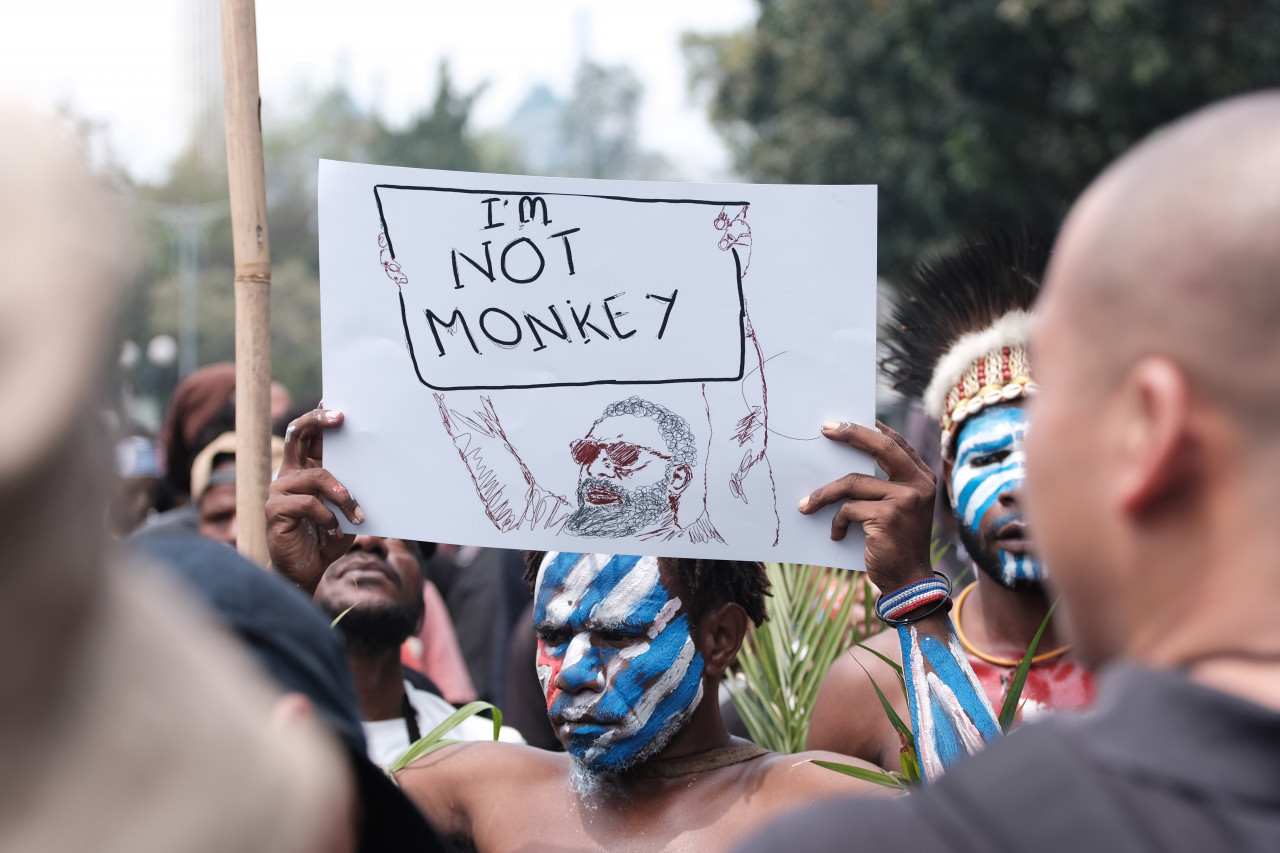Papuan groups oppose special autonomy status
Change Size

S
ixteen groups in Papua have voiced opposition over the potential continuation of its special autonomy (Otsus) status, with the transfer of Otsus funds from the central government set to end next year.
Protesting under a movement called Petisi Rakyat Papua (Petition by Papuans), the groups also demanded a referendum to determine their own fate.
The administration of former president Megawati Soekarnoputri passed a law on special autonomy in Papua and West Papua provinces to guarantee Papuans the right to manage their own region politically, economically and culturally. The law also stipulated the allocation of special autonomy funds, valid for 20 years.
As the transfer of funds will end in 2021, the House of Representatives has included deliberation of Papua’s special autonomy status in this year’s National Legislation Program (Prolegnas) priority list.
“The House proposed the bill without discussing it with indigenous Papuans, who are the subject of the bill. Papuans are the ones who get to determine whether they want a second phase of special autonomy or independence,” Victor Yeimo, National Committee of West Papua (KNPB) spokesperson and one of the petition’s initiator, told The Jakarta Post on Saturday.
The executive director of the United Liberation Movement for West Papua (ULMWP), Markus Haluk, said that even though the ULMWP already had a petition bearing the signatures of 1.8 million Papuans who demanded a referendum, a more recent petition would express their opposition to Papuan bureaucrats who made compromises over the Otsus with elites in Jakarta.
Activist and former Papuan prisoner Sayang Mandabayan expressed distrust over Papuan representatives in the House.
“Enough of the political compromises. We refuse the unilateral [deliberation of the bill] by the special House committee,” she said.
The groups lambasted the Otsus for failing to bring about significant change in Papua and legitimizing colonialism.
“Ever since before the Otsus until today, almost 20 years after the Otsus, racism toward Papuans, land grabbing, military operations, rights abuse, and social and economic inequality keep happening in Papua,” Papuan Students Alliance head John Gobay said.
The government has allocated US$7.4 billion in Otsus funds to grow Papua’s economy. Despite the hefty budget, the National Development Planning Agency noted that Papua was home to almost a million impoverished people and over 6,000 underdeveloped villages. Papua and West Papua also has the lowest human development index in the country, according to Statistics Indonesia (BPS).
A researcher on Papua studies at the Indonesian Institute of Sciences (LIPI), Aisah Putri Budiatri, said expressions of opposition to the special autonomy status occurred in 2005 and 2010 when Papuans symbolically returned the system to the government.
“Besides its perceived inability to address the problems in Papua, the special autonomy has weak legitimacy as the deliberation did not include all parties such as the pro-Papuan independence group,” Aisah told the Post.
She added that while the Otsus law was pretty comprehensive as it included regulations related to human rights violations in Papua, there had been a lack of results.
“For example, the government has yet to form the Truth and Reconciliation Commission (KKR), as stipulated in the law,” she said.
Jayapura city secretary Frans Pekey said that, before deliberation over extending the Otsus law, there should be a thorough evaluation of it and how it had been implemented to determine whether it was effective.
“If it is shown to have failed, we should evaluate and revise it through the existing mechanism. Let’s be realistic, Papua is still a part of Indonesia and Papuans need education, health care and other basic infrastructure to thrive,” he said.
Mandabayang said, however, neither the special autonomy law nor a developmental approach was a solution to racism toward Papuans.
In January, Home Affairs Minister Tito Karnavian urged the House to immediately deliberate the bill as he argued the special autonomy fund would accelerate Papua’s development and help resolve the issues of discrimination in the province.
The ministry’s regional autonomy director general Akmal Malik did not respond to the Post’s queries on Tuesday regarding the recent protests against the continuation of special autonomy status.
LIPI’s Papua Research Team has since 2009 analyzed the root causes of the conflict in Papua, determining that it all stems from the marginalization and discrimination of indigenous Papuans, development failures, disputes over political identity, the annexation of Papua and violence against Papuans.
“As of today, the government has yet to use dialogue to address the issues in Papua. With the deadline to end special autonomy funds getting closer, now is the time for the President to carry out dialogue to rebuild the trust that leads to reconciliation in Papua,” Aisah said.
Editor's note: This article has been updated to reflect that the Home Affairs Ministry did not respond to The Jakarta Post's request for comment









